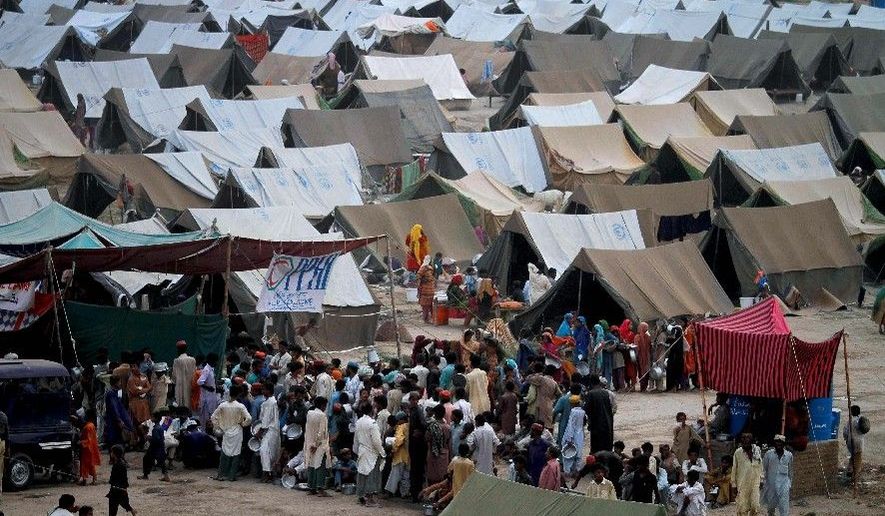Pakistan’s ambassador to the United States is warning that militants will exploit the aftermath of devastating floods unless the international community moves quickly to alleviate the massive humanitarian crisis of 20 million dislocated people.
Ambassador Husain Haqqani said the international community has been slow to recognize the scale of the devastation, attributing the tepid global response to the relatively low death toll of 1,500.
“The rest of the world has to move fast and make sure that the floods do not result in a situation that can be exploited by extremists and militants,” Mr. Haqqani told The Washington Times in an interview at his office.
He said international leaders must recognize that the flood is a “major disaster” that has affected tens of millions in Pakistan.
“People should not measure tragedies only in terms of fatalities. They should recognize the potential for illness, the potential for long-term damage to the people, and the potential for people who were not in poverty before the floods falling into poverty,” he added.
Charities linked to militant groups have been providing aid to flood victims in an effort to build inroads with the community.
Mr. Haqqani said the flood had strained Pakistan’s capacity to deal with militants. The government is trying to clamp down on the groups, which had an initial advantage because they were physically present in the areas affected by the floods.
“They do not have the capacity to move large quantities of goods needed by the people. So after an initial media display, many of these groups are no longer visible and will become less and less visible,” Mr. Haqqani said.
Last week in Pakistan, Raj Shah, administrator of the U.S. Agency for International Development, was forced to cut short a visit to a food-distribution center in Sukkur after his security detail noticed suspicious people in the vicinity.
The camp was run by Falah-e-Insaniyat, a charity linked to the terrorist group Lashkar-e-Taiba, according to some reports, but Mr. Shah said it was a World Food Program food distribution center.
“Anti-democratic forces have a greater potential to benefit from this crisis than anyone else,” said Ayesha Siddiqa, an Islamabad-based political analyst.
But Mr. Haqqani downplayed the significance of Islamist charities.
“There are more than 3,000 government-run camps in the four provinces that have been affected by the floods. However … having been a journalist … I also realize that the sexier story is the 15 camps run by Islamist groups or 20 camps run by Islamist groups,” he said.
The flooding has submerged one-fifth of Pakistan’s territory, about the size of Italy.
In a column in the Boston Globe, Sen. John Kerry, who recently visited flood-affected areas in Pakistan, took note of the weak international response.
“So far, the world isn’t keeping up with the challenge,” said Mr. Kerry, Massachusetts Democrat and chairman of the Senate Foreign Relations Committee.
Ms. Siddiqa said the international community needs to heed these concerns.
“Money needs to come in fast,” she said.
The international community has donated or pledged more than $2 billion for flood relief. Mr. Haqqani said Pakistan needs much more as it grapples with the challenges of reconstruction and rehabilitation.
The U.S., which was the first country to respond to the crisis, has committed $200 million.
One of the factors holding back international donors is Pakistan’s rampant corruption.
Lisa Curtis, a senior research fellow on South Asia at the Heritage Foundation, said a spate of news about the misuse of funds in Afghanistan and Pakistan may have caused private donors to worry that their contributions will not make a difference.
Mr. Haqqani said Pakistan has a record of transparency when it comes to disaster relief.
“I don’t think that anybody seriously is concerned about lack of transparency in providing assistance to people who are in need of a very fundamental and basic help like clean water for survival,” he said.
The ambassador said Pakistan will work with the international community to create transparent mechanisms.
“No one is saying write a check to the government of Pakistan and put it in the kitty,” he added.
Most of the assistance has been in kind — helicopter evacuation flights, water purification tablets, cholera vaccines or tents.
“I do not see how any of this is going to be misused. … What are people going to do with the tents which are for displaced people?” Mr. Haqqani said.
As the floodwaters recede, concerns grow about the outbreak of disease, a likelihood that becomes all the more real as rotting carcasses of drowned livestock surface.
The floods also have given rise to speculation in some quarters that Pakistan, a fragile democracy, could be pushed to the brink of instability.
“The fact of the matter is that the story in the floods of Pakistan is the human suffering. Political consequences, if any, are just a secondary story,” Mr. Haqqani said.
He attributed the criticism about the news coverage to a section of Pakistanis, Pakistani-Americans and an anti-government Pakistani media. He said these groups had created a “narrative about the politics of the disaster rather than the humanitarian impact of the disaster.”
• Ashish Kumar Sen can be reached at asen@washingtontimes.com.




Please read our comment policy before commenting.